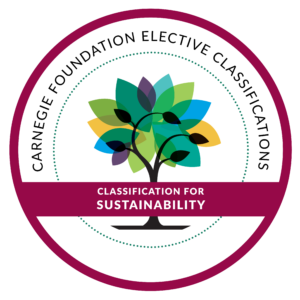The Carnegie Elective Classification for Sustainability is an innovative initiative designed to recognize and celebrate higher education institutions that demonstrate a commitment to sustainability and climate action as integral to their academic missions. This classification provides a rigorous framework for assessing and advancing sustainability efforts in curriculum, research, operations, and community engagement.
Why Sustainability Matters
Higher education institutions play a critical role in addressing global challenges, including climate change and resource sustainability. The Carnegie Elective Classification for Sustainability highlights and supports institutional efforts to lead in these areas by fostering innovation, collaboration, and measurable progress toward a more sustainable future. The Carnegie Foundation for the Advancement of Teaching and the American Council on Education (ACE) developed this classification to support thriving, sustainable communities for current and future generations. These efforts are culturally, regionally, and contextually informed.
Development Process
The Carnegie Elective Classification for Sustainability was developed through a thoughtful, inclusive process led by the Carnegie Foundation and ACE. The development process included:
- Initial feasibility study (2023): A comprehensive review of existing sustainability frameworks, expert interviews, and field research identified the need for a dedicated classification to recognize sustainability in higher education.
- Stakeholder engagement (2024): Through in-person meetings, virtual convenings, and surveys at major conferences, insights were gathered from sustainability leaders; institutional representatives from over 43 colleges and universities; and organizations such as the Association for the Advancement of Sustainability in Higher Education (AASHE), Second Nature, U.S. Partnership for Education for Sustainable Development, and This Is Planet Ed at the Aspen Institute.
- Pilot program (2025): A cohort of 20 diverse institutions representing minority serving institutions, community colleges, research universities, and liberal arts colleges is participating in a yearlong pilot program. This pilot will shape the framework, indicators, and application process for the classification.
University of Colorado Boulder: Operational Host for the Carnegie Elective Classification for Sustainability
CU Boulder is a recognized leader in sustainability research, campus action, and applied learning. The university combines world-class earth and environmental science research with campus-wide climate planning and hands-on sustainability programs. CU Boulder’s experience includes:
- Robust interdisciplinary research centers and programs that advance climate science and sustainability solutions
- A campus Climate Action Plan and an active institutional sustainability office focused on mitigation, resilience, and equitable approaches
- Longstanding student-facing applied sustainability initiatives, including learning hubs and campus programs that turn research into practice
This blend of research excellence, operational experience, and public engagement positions CU Boulder to manage the practical, technical, and convening responsibilities of the Carnegie Sustainability Elective Classification.
Key Features of the Classification
The Carnegie Elective Classification for Sustainability aims to:
- Recognize excellence: Highlight institutions that integrate sustainability into their core academic missions and campus practices
- Encourage innovation: Foster creative solutions to sustainability challenges through research, teaching, and community engagement
- Promote access: Ensure accessibility for all institutions, including those with fewer resources, by offering adaptable criteria and support
- Foster collaboration: Build on existing frameworks, such as AASHE’s Sustainability Tracking, Assessment, and Rating System, to align efforts and maximize impact
Acknowledgment of Sponsors
The Carnegie Elective Classification for Sustainability initiative is made possible through the generous support of our sponsors: Lumina Foundation, The Kresge Foundation, and the Gates Foundation.
We are deeply grateful for their commitment to advancing sustainability in higher education and their shared vision of fostering innovation, collaboration, and solutions-based action. Their support has been instrumental in shaping the development of the classification from the initial feasibility study through the pilot program.
These partnerships reflect a collective dedication to empowering institutions to address global challenges and create a more sustainable future for students, communities, and society.
We thank them for their unwavering support and leadership in this important endeavor.
Join Our Mailing List
Stay updated on the progress of the Elective Classification for Sustainability and learn how your institution can participate in this transformative initiative.
Our email opt-in form uses iframes. If you do not see the form, please check your tracking or privacy settings.
Contact Us
For questions about the Elective Classification for Sustainability, contact Marisol Morales at [email protected].
